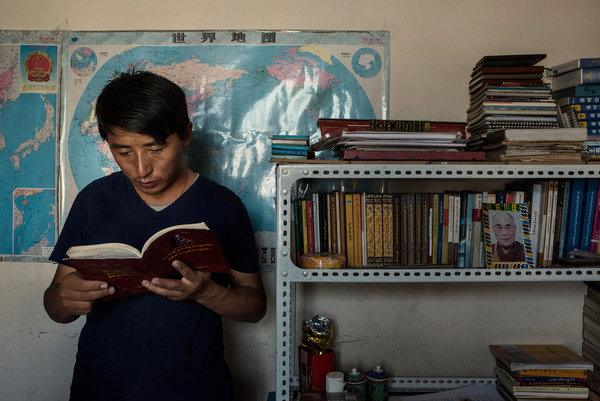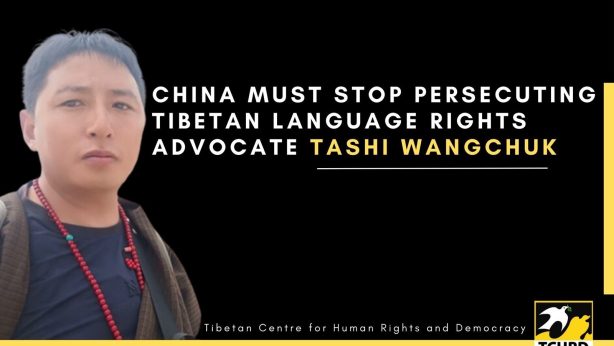Illegal detention of Tibetan language activist underscores near-absolute Chinese state repression

The Tibetan Centre for Human Rights and Democracy (TCHRD) condemns the ongoing illegal detention of Tashi Wangchuk, 30, a Tibetan businessman who has been a vocal advocate for the preservation and promotion of Tibetan language education in Kyegudo (Ch: Yushu) Tibetan Autonomous Prefecture, Qinghai Province, in the Tibetan province of Kham.
According to a 10 March 2016 report by the New York Times , Tashi Wangchuk had been detained for 44 days since 27 January. Tashi’s family and relatives had contacted the local Public Security Bureau (PSB) office a number of times asking to see him but were denied permission. Quoting a senior PSB officer in Yushu, the report said Tashi was being held by guobao (Chinese state security police) but did not give more details.
It appears that Tashi was detained secretly without the knowledge of family and relatives. Almost a month and a half later, they have no idea where he is being held and in what condition. No charges had been filed. Chinese law requires that the detention officers inform a suspect’s family within 24 hours, and charges to be filed within a month. But the amended Chinese Criminal Procedure Law introduced in 2013 also allows police to detain a suspect for as long as six months without informing his or her family if ‘national security’ crimes are involved. Tibetans are commonly charged with national security crimes such as endangering state security, leaking state secrets or causing inter-ethnic conflicts.
With the introduction of draconian laws such as the National Security Law last July, it is up to the authorities to decide what makes a national security crime. The National Security Law relies on broad definitions and vague language that could criminalize any action or statement. For instance, the second section of the National Security Law contains a list of 18 items that are considered part of the PRC’s national security: religious beliefs (Article 27); resisting “negative cultural influences” (Article 23); ethnic minorities (Article 26); and, outer space, international seabeds and the polar regions (Article 32).
Tashi Wangchuk was detained a couple of months after he gave interviews to the New York Timesreporters which was later featured in two reports, including a nine-minute documentary film, published in November and December 2015. Tashi was the main focus of the documentary in which he was shown travelling to Beijing and visiting governments offices and courts to file a petition calling for the implementation of Chinese legal provisions that guarantee rights to Tibetan language education. The documentary captured the frustration and helplessness of many Tibetan activists such as Tashi, who are forced to seek justice in a discriminatory and repressive system.
Tashi’s detention by state security agents highlights the arbitrary and illegal nature of the Chinese justice system. In keeping with president Xi Jinping’s call for establishing a society based on rule of law, Tashi used domestic legal provisions to call for the protection and promotion of Tibetan language and culture. He had previously written blogposts and participated in online discussions on the survival of Tibetan language and culture. Tashi’s language activism has nothing to do with endangering China’s national security. Speaking to New York Times, Tashi had said that he was not an advocate for Tibetan independence but that his main concern was cultural preservation.
Illegal detention of peaceful Tibetan activists is a common occurrence. In recent years, many Tibetan environmentalists, social activists, community leaders, and language activists like Tashi have been detained, tortured, shot at and imprisoned. Particularly since the 2008 uprising, the Chinese authorities have always viewed Tibetans as politically suspect and all cases involving Tibetan suspects are almost always treated as ‘sensitive’ or ‘controversial’.
Tashi Wangchuk had been detained twice in the past. Over a decade ago, he was detained by the Chinese police while attempting to on a pilgrimage to India. In 2012, he was detained for for posting online criticisms against land grab. In 2012, Mr. Tashi was detained for posting online criticisms against land grabbing by authorities.
TCHRD calls for the immediate release of Tashi Wangchuk from illegal detention and for his family and relatives to meet him to ascertain his health and well-being. The detention officers must ensure Tashi’s physical and psychological health during the detention period. The worst torture and beatings occur in detention when a suspect is kept in secret without the knowledge of the outside world, and at the mercy of his interrogators. TCHRD urges the Chinese authorities to respect and fulfil the basic rights and fundamental freedoms of Tashi Wangchuk during his detention.
On 30 March 2016, the New York Times reported that Tashi Wangchuk has been charged with inciting separatism and was being held at the main detention center in Yushu town. Tashi’s family was unable to find a lawyer to defend Tashi. Authorities have not announced the trial date.


